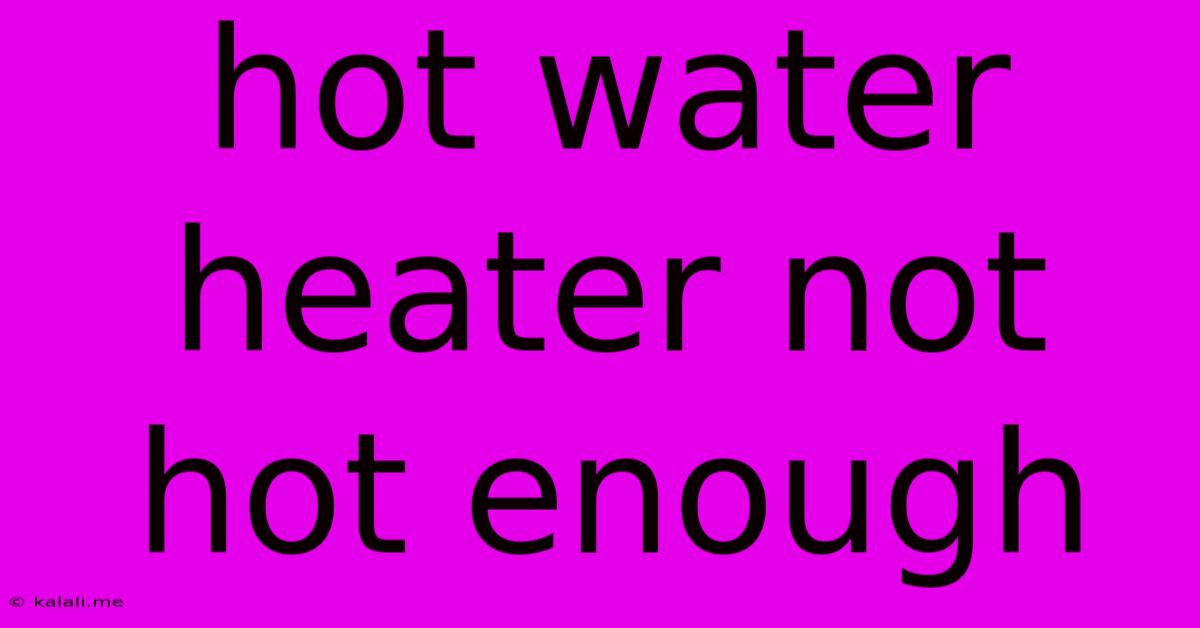Hot Water Heater Not Hot Enough
Kalali
Jun 05, 2025 · 4 min read

Table of Contents
Hot Water Heater Not Hot Enough? Troubleshooting Tips and Solutions
Is your shower leaving you feeling less than refreshed? A lukewarm shower can be incredibly frustrating, and a hot water heater that's not producing hot enough water is a common household problem. This comprehensive guide will walk you through the most common causes of this issue and provide practical solutions to get your hot water flowing at the perfect temperature. We'll cover everything from simple checks to more involved repairs, helping you diagnose and fix the problem quickly and efficiently.
Understanding Your Water Heater: Types and Components
Before we dive into troubleshooting, it's helpful to understand the basics of your hot water heater. Most homes use either a tank-style or a tankless water heater. Tank-style heaters store heated water, while tankless heaters heat water on demand. Both types can suffer from similar issues leading to insufficient hot water. Key components to consider include:
- Thermostat: This controls the water temperature. A malfunctioning thermostat is a frequent culprit.
- Heating Element (for electric heaters): These elements heat the water. A failing element can lead to inadequate heating.
- Burner (for gas heaters): This ignites the gas to heat the water. Problems with the burner or gas supply can reduce hot water temperature.
- Sediment Buildup: Minerals in your water can accumulate at the bottom of a tank-style heater, reducing efficiency and heat transfer.
- Temperature and Pressure Relief Valve: This safety device releases pressure; a faulty valve can affect water temperature.
Common Reasons for Insufficient Hot Water
Now let's explore the most common reasons why your water heater isn't getting hot enough:
- Low Thermostat Setting: The simplest explanation is that your thermostat is set too low. Check the setting and increase it gradually until you reach your desired temperature.
- Faulty Thermostat: A malfunctioning thermostat can fail to regulate the water temperature correctly. This often requires replacement.
- Heating Element Problems (Electric Heaters): A faulty or burnt-out heating element is a common problem in electric water heaters. This requires element replacement.
- Gas Burner Issues (Gas Heaters): Issues with the gas burner, pilot light, or gas supply can prevent the water from heating properly. This may involve inspecting the burner, pilot assembly, and gas line for blockages or leaks. Always prioritize safety and potentially consult a professional for gas-related issues.
- Sediment Buildup (Tank Heaters): Sediment accumulation reduces heat transfer efficiency. Regular flushing can help maintain optimal performance.
- Insufficient Water Supply: Low water pressure can affect the water heater's ability to heat adequately. Check your main water supply for any pressure issues.
- Leaky Hot Water Pipes: Leaks in the hot water pipes can lead to insufficient hot water at the tap. Check all pipes for leaks and address as needed.
- Excessive Water Usage: If multiple people are using hot water simultaneously, this can deplete the tank faster than it can be reheated, resulting in lukewarm water.
Troubleshooting Steps: A Step-by-Step Guide
- Check the Thermostat Setting: This is the first and easiest step. Ensure the thermostat is set to your desired temperature.
- Check for Sediment Buildup (Tank Heaters): If you have a tank-style heater, consider flushing it to remove sediment. Instructions for flushing vary depending on the type of heater.
- Inspect the Heating Element (Electric Heaters): Visually inspect the heating element for damage. A burnt-out or corroded element will need replacing.
- Examine the Burner (Gas Heaters): Check the burner for any obstructions or damage. Inspect the pilot light to ensure it's lit and functioning correctly.
- Check Water Pressure: Ensure sufficient water pressure is reaching your water heater. Low pressure can impede heating.
- Inspect Hot Water Pipes: Look for leaks or corrosion in your hot water pipes. Repair any leaks promptly.
- Check for Excessive Water Usage: If the problem only occurs during periods of high water demand, consider ways to reduce simultaneous usage.
When to Call a Professional
While many of these issues can be addressed with simple DIY solutions, some problems require the expertise of a qualified plumber or heating technician. Always call a professional if:
- You suspect a gas leak.
- You're uncomfortable working with electrical components.
- The problem persists after trying basic troubleshooting steps.
- You're unsure about any aspect of the repair process.
By systematically checking these points, you can pinpoint the cause of your lukewarm water and get back to enjoying perfectly hot showers and baths. Remember safety first! If you are unsure about any repair, consult a qualified professional.
Latest Posts
Latest Posts
-
How To Keep Glasses From Sliding Down My Nose
Jun 07, 2025
-
Fallout 4 How To Run Wire
Jun 07, 2025
-
Why Is My Cat Whining For Food So Much
Jun 07, 2025
-
Why Do Lots Of Companies Not Allow Prepaid Cards
Jun 07, 2025
-
Gimp Remove White Background To Transparent
Jun 07, 2025
Related Post
Thank you for visiting our website which covers about Hot Water Heater Not Hot Enough . We hope the information provided has been useful to you. Feel free to contact us if you have any questions or need further assistance. See you next time and don't miss to bookmark.